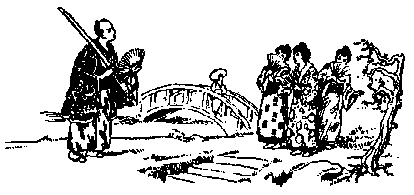Gilbert & Sullivan Opera
A History and a Comment
by H. M. Walbrook
CHAPTER X.
THE JAPANESE OPERA.

It is rather interesting to take a look round theatrical London on one of those now so faraway evenings. Let us select the night of Saturday, March 14th, 1885, and see what is happening. Irving is away in America, so we miss that solid block of people in his old pit entrance; and Toole is on tour in the provinces; but the Bancrofts are at the Haymarket, Henry Arthur Jones's play, Saints and Sinners, is at the Vaudeville, Wilson Barrett is acting in Lord Lytton's play, Junius, at the Princess's in Oxford Street ; Edward Terry is convulsing the public at the Gaiety in the burlesque, Mazeppa; W. S. Penley is causing the audience at the Globe to roll in their seats as he babbles of milk and Bath buns in The Private Secretary. Charles Wyndham is dazzling a crowded house in the humours of The Candidate at the merry little Criterion ; Promenade Concerts are being given at Her Majesty's, and there is a Circus at the Opera House in Covent Garden.
On that night the most popular (for man y years) of all the Gilbert and Sullivan operas, The Mikado, or the Town of Titipu, was produced for the first time at the Savoy. It received a welcome which even the moderately worded Press of that day described as tumultuous. Playgoers present on that occasion talked for years after of the roar from the whole audience that followed the trio, "Three little maids from school," and was twice renewed with undiminished volume, until two more repetitions had been granted, and also of the visible and audible movement of delight that swept over the house as it listened for the first time to the music of "For he's going to marry Yum-Yum." As somebody said, "The whole thing is like a glass of champagne."
In one of the boxes that night sat the Duke and Duchess of Edinburgh, in another Dr. (afterwards Sir) Morell Mackenzie, and between the Acts Mr. J. McNeill Whistler "vibrated symphoniously from stall to gangway and back." In the Pall Mall Gazette of the following Monday two pages were devoted to an account of the production, illustrated with admirable pen-and-ink portraits of the author and composer and the manager of the theatre, sketches of the scenery and the picturesquely-attired characters, and facsimile autographs of scraps of the score , with Sullivan's signature attached; and a few days later the musical critic on the staff of the weekly paper, The World, went so far in his enthusiasm as to compare the work with Dante's "Divina Commedia." Thus commenced a run destined to reach 672 performances, and to last nearly two years.
It will be remembered how large a part the fan plays in The Mikado. Men and women alike are continually opening and shutting and fluttering fans. From behind three of these dainty aids to the imagination the Three Little Maids from School squeak and giggle. With another Pooh-Bah waves away his awe-stricken and hysterical feminine admirers, and with a flick of yet another Ko-Ko illustrates the beheadal of a guineapig. On the first night the audience were almost as fascinated by the fans as by those who so gracefully managed them. Miss Leonora Braham, Mr. Rutland Barrington and the rest seemed to have been using fans all their lives. Thereby hangs a tale. Another of the attractions in London at that time was a highly elaborate representation of a Japanese village at Albert Gate, Knightsbridge, in which over a hundred Japanese men and women and children were to be seen at work and at play in five streets of cunningly built Japanese houses. This exhibition is actually referred to in the scene in the second Act, in which the Emperor is endeavouring to discover the whereabouts of his vanished son, the heir to the throne of Japan, in the following sentences:
- MIKADO:
- Would it be troubling you too much if I asked you to produce him? He goes by the name of Nanki-Poo.
- KOKO:
- Oh, no! not at all, only
- MIKADO:
- Yes?
- KOKO:
- It's rather awkward, but in point of fact he's gone abroad.
- MIKADO:
- Gone abroad ? His address?
- KOKO:
- Knightsbridge!
While the opera was under rehearsal, Gilbert had a number of the Japanese men and women from Knightsbridge down to the theatre to give lessons in the art of using a fan. That is only one of many instances of his thoroughness. He literally neglected nothing. Long before the rehearsals of a new opera would begin, he would go through it all on a little mimic stage at home and settle every detail of grouping, colour, and costume to his satisfaction. And yet he was never satisfied! It is the old story. The more we know the more we realise how little we know; and the more we achieve the more we perceive how far our achievement falls short of perfection.
The libretto satirizes snobbery and pluralism in the person of Pooh-Bah, a variety of the bores and burdens of life in Koko's and the Mikado's songs, over-mature feminine skittishness in the person of Katisha, and, in the way in which the dénouement is reached, the fallibility of Logic. The comicality of it all is brimming. Pooh-Bah's account of himself has become a classic of English humorous literature:
- I am in point of fact a particularly haughty and exclusive person of preAdamite ancestral descent. You will understand this when I tell you that I can trace my ancestry back to a protoplasmal primordial atomic globule. Consequently, my family pride is something inconceivable. I can't help it. I was born sneering. But I struggle hard to overcome this defect. I mortify my pride continually. When all the great Officers of State resigned in a body because they were too proud to serve under an ex-tailor, did I not unhesitatingly accept all their posts at once?
- PISH TUSH:
- And the salaries attached to them? You did.
- POOH BAH:
- It is consequently my degrading duty to serve this upstart as First Lord of the Treasury, Lord Chief Justice, Commander in Chief, Lord High Admiral, Master of the Buckhounds, Groom of the Back Stairs, Archbishop of Titipu, and Lord Mayor, both acting and elect, all rolled into one. And at a salary! A Pooh-Bah paid for his services! I, a salaried minion But I do it! It revolts me, but I do it.
- NANKI POO:
- And it does you credit.
- POOH BAH:
- But I don't stop at that. I go and dine with middle-class people on reasonable terms. I dance at cheap suburban parties for a moderate fee. I accept refreshments at any hands, however lowly. I also retail State secrets at a low figure.
In the Mikado's song, with the refrain (which has passed into a proverb):
- My object all sublime
- I shall achieve in time
- To let the punishment fit the crime —
the verses pronouncing the doom of the music-hall singer and the billiard-sharp are certainly as familiar as any rhyme in comic opera, yet they never fail to evoke a laugh that nearly drowns the orchestra — the billiard-sharp verse particularly. On the other hand the words of the madrigal beginning, "Brightly dawns our wedding day," are as tender and beautiful as the music.
The score has a richer tone-colour than any of the preceding operas had exhibited; the flow of melody is as spontaneous and varied as ever, while here and there (in the accompaniment to parts of "A Wandering Minstrel I," for example) the music is as witty as the words. The famous madrigal already alluded to is pure English, and even a critic so severe upon all Sullivan's work as Dr. Ernest Walker, of Oxford, has admitted that "in its trifling way this piece is the work of a genuine and delicate-handed artist." Here and there, to fit the words, he wrote in an idiom of the East, and these pages are not the least picturesque in the opera.
The Mikado not only filled the Savoy for nearly two years, but had a great success in America, and a still more remarkable one in Germany, where it was speedily put into the repertory of the day, a position which (as has already been stated) it still occupies. It would be interesting, if it were possible, to give the number of its performances throughout the world up to the present year. In London alone it has certainly been played over a thousand times. Taking all the performances together, the people who have seen it must assuredly be numbered in millions. Including amateurs and professionals, there is probably not a ball in London which would accommodate all the people who have played a part in one or other of its performances. No other comic opera has had so brilliant a career.
